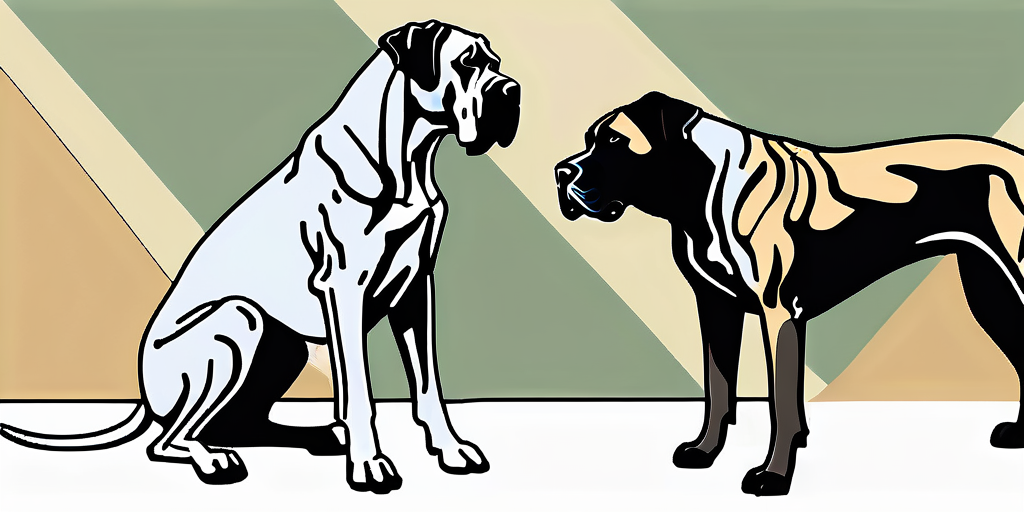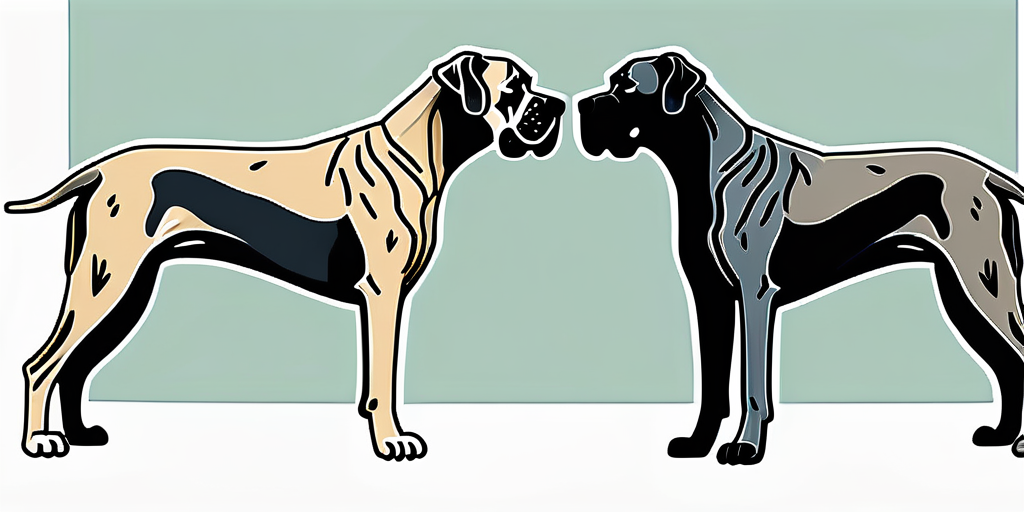If you’re considering getting a new furry friend to join your family, two popular breeds that might catch your attention are the Great Dane and the Cane Corso. Both breeds have their unique characteristics and qualities that can make them a great addition to any home. However, it’s important to understand the differences between these breeds to determine which one is the right fit for you. In this article, we will delve into the history, physical characteristics, personality and temperament, health and lifespan, as well as training and exercise needs of both breeds. By the end, you’ll have a better understanding of whether a Great Dane or a Cane Corso is the perfect companion for you and your lifestyle.
Understanding the Breeds
The History of the Great Dane
The Great Dane, also known as the “Apollo of Dogs,” is a breed with a rich history that can be traced back to ancient civilizations. The exact origin of the breed is a bit murky, but it is widely believed that the Great Dane descends from a mix of ancient Mastiff-like dogs. The breed’s roots can be found in Germany, where it was bred for hunting large game, including wild boars. Over time, the Great Dane’s popularity grew, and it eventually became favored by European nobility as a regal and elegant companion.

Known for their imposing size and gentle demeanor, Great Danes are often referred to as “gentle giants.” Despite their large stature, they are known to be affectionate and friendly, making them excellent family pets. Great Danes require ample space to move around due to their size, but they are generally well-mannered and adaptable dogs.
The History of the Cane Corso
The Cane Corso, on the other hand, is a breed with roots planted firmly in Italy. Originally used as a working dog, the Cane Corso’s ancestors can be traced back to the Roman Empire. They were primarily used as guard dogs, cattle drovers, and even war dogs. The breed faced a decline in numbers after World War II but was revived by dedicated breed enthusiasts. Today, the Cane Corso is known for its loyalty, versatility, and protective nature, making it a popular choice for many dog lovers.
Cane Corsos are known for their strong guarding instincts and intelligence. They are highly trainable and excel in various canine sports and activities. Despite their protective nature, Cane Corsos are also known to be affectionate and loyal companions to their families. Proper socialization and training are crucial for this breed to ensure they grow up to be well-rounded and well-behaved dogs.
Physical Characteristics
Size and Appearance of the Great Dane
When it comes to size, the Great Dane takes the spotlight. Known for its towering height, a fully-grown male Great Dane can reach up to 32 inches at the shoulder and weigh between 140 and 175 pounds. Despite their imposing size, Great Danes are known for their graceful and elegant build. They have a deep chest, sturdy legs, and a long, muscular neck. The Great Dane’s coat is short and smooth, with colors ranging from fawn and brindle to black and harlequin.
One fascinating aspect of the Great Dane’s history is its origins in Germany, where it was originally bred to hunt wild boars. This hunting background explains their powerful build and keen sense of smell. Great Danes are also known for their gentle and friendly demeanor, making them excellent family pets despite their size.
Size and Appearance of the Cane Corso
While not as tall as the Great Dane, the Cane Corso still carries an impressive presence. Males typically stand between 24 and 28 inches at the shoulder and weigh between 90 and 120 pounds. The Cane Corso is a well-muscled breed with a sleek and athletic build. Their coat is short and dense, providing protection from the elements. Common coat colors include black, fawn, gray, and brindle.
Originating from Italy, the Cane Corso has a rich history as a versatile working dog. Traditionally used as a guard dog and for hunting, the Cane Corso is known for its loyalty and protective nature. Despite their strong and muscular appearance, Cane Corsos are also affectionate and devoted companions to their families, forming strong bonds with their human counterparts.
Personality and Temperament
The Great Dane’s Personality
Behind their large and imposing stature, Great Danes are gentle giants. They are known for their friendly and affectionate nature, making them excellent companions for families. Great Danes thrive on human companionship and are eager to please their owners. They are typically good with children and can be quite gentle and patient around them. However, due to their size, it’s essential to socialize them properly from a young age to ensure they are well-behaved and comfortable in various situations.
Great Danes are also known for their playful and goofy demeanor, often engaging in silly antics that can bring joy and laughter to their families. Despite their massive size, they are known to be couch potatoes, enjoying lounging around the house with their loved ones. This breed is known for its sensitivity and can be deeply affected by harsh tones or punishment, responding much better to positive reinforcement and gentle training methods.
The Cane Corso’s Temperament
In contrast, the Cane Corso is known for its protective nature. They are naturally wary of strangers and possess a strong instinct to guard their family and territory. This breed is loyal, devoted, and highly trainable, making them an excellent choice for experienced dog owners who can provide consistent leadership and positive reinforcement. While Cane Corsos can be friendly and affectionate towards their owners, they may display a more reserved demeanor around unfamiliar people. Early socialization and proper training are crucial to ensure a well-rounded and well-behaved Cane Corso.
Cane Corsos are also known for their intelligence and problem-solving abilities, often requiring mental stimulation to prevent boredom and destructive behaviors. This breed excels in activities that challenge their minds, such as obedience training, agility courses, and interactive puzzle toys. Despite their protective instincts, Cane Corsos can also have a playful side, enjoying games and activities that strengthen their bond with their families.
Health and Lifespan
Health Issues in Great Danes
Like many large dog breeds, Great Danes are prone to certain health issues. One of the most common concerns in this breed is bloat, a life-threatening condition that affects deep-chested dogs. Bloat, also known as gastric dilatation-volvulus (GDV), occurs when the stomach fills with gas or fluid and then twists on itself. This can lead to a rapid onset of symptoms, including restlessness, unproductive retching, and a swollen abdomen. Immediate veterinary attention is crucial to save the dog’s life in cases of bloat. In addition to bloat, Great Danes may also be at risk for other conditions such as cardiomyopathy, hypothyroidism, and certain types of cancer.

Regular exercise, proper diet, and feeding strategies can help minimize the risk of bloat in Great Danes. It is important to feed them multiple small meals throughout the day instead of one large meal and to avoid vigorous exercise right after eating. Great Danes are also susceptible to hip dysplasia, a condition that affects the hip joints and can cause pain and mobility issues. Routine veterinary check-ups are essential to monitor the dog’s overall health and catch any potential problems early.
Health Issues in Cane Corsos
Similarly, Cane Corsos can also be prone to certain health issues. One notable concern is hip dysplasia, which is prevalent in large dog breeds. Hip dysplasia is a genetic condition where the hip joint does not develop properly, leading to arthritis and pain. Cane Corsos are also at risk of developing inherited heart diseases, such as dilated cardiomyopathy, a condition that affects the heart muscle and can result in heart failure. Additionally, this breed may be susceptible to certain eye conditions, like progressive retinal atrophy, which can lead to vision impairment and blindness if left untreated.
Regular exercise, a balanced diet, and regular veterinary care are crucial for maintaining the overall health and well-being of a Cane Corso. It is important to provide joint supplements to support hip health and to monitor the dog’s heart health through routine check-ups and diagnostic tests. Early detection and management of health issues can help Cane Corsos live long, healthy lives with their families.
Training and Exercise Needs
Training a Great Dane
When it comes to training, Great Danes are generally eager to please and respond well to positive reinforcement techniques. Early socialization is vital to instill good manners and ensure that the Great Dane grows into a well-behaved adult dog. Due to their size, leash training is essential to prevent them from pulling and dragging their owners. Great Danes also benefit from obedience training, as it aids in their mental stimulation and helps establish a strong bond with their owners.
One important aspect of training a Great Dane is understanding their exercise needs. Despite their large size, Great Danes are not overly active dogs. They have a moderate energy level and require regular exercise to maintain their physical and mental well-being. Daily walks and playtime in a securely fenced yard are essential to prevent boredom and destructive behavior.
In addition to physical exercise, mental stimulation is crucial for a Great Dane’s overall development. Engaging them in interactive games, puzzle toys, and obedience training sessions can help keep their minds sharp and prevent them from becoming bored or restless. Great Danes are intelligent dogs, and they thrive when given opportunities to learn and problem-solve.
Training a Cane Corso
Training a Cane Corso requires a firm and consistent approach. This breed is highly intelligent, and they thrive on positive reinforcement methods paired with clear boundaries and guidelines. Early socialization is crucial to prevent the development of any aggressive behavior towards unfamiliar people or animals. As natural protectors, Cane Corsos make excellent candidates for advanced training in areas such as obedience, tracking, and protection sports. Regular exercise, including mental stimulation, is vital to keep them physically and mentally fit.
When it comes to exercise, Cane Corsos are a more active breed compared to Great Danes. They have a higher energy level and require daily exercise to prevent boredom and potential behavioral issues. Long walks, jogging, or engaging in activities such as agility training or fetch can help fulfill their exercise needs. Mental stimulation is equally important for a Cane Corso’s well-being. Providing them with challenging toys, interactive games, and obedience training sessions can help keep their minds sharp and prevent them from becoming restless or anxious.
In conclusion, both the Great Dane and the Cane Corso are wonderful breeds with their unique qualities. The Great Dane is known for its gentle and friendly nature, making it a great choice for families looking for a loyal and affectionate companion. On the other hand, the Cane Corso offers a protective and devoted personality, making it a suitable option for experienced dog owners seeking a loyal and vigilant companion. Remember, whichever breed you choose, responsible ownership, proper training, and regular veterinary care are crucial for the well-being and happiness of your four-legged friend.
Discover More with BreedRead
Deciding between a Great Dane and a Cane Corso is just the beginning of your journey with your new companion. At BreedRead.com, we understand the importance of making an informed decision and are here to support you every step of the way. Our extensive library offers in-depth comparisons, breed profiles, and tailored owner guides to help you understand and care for your chosen breed. Subscribe to our free newsletter today and gain access to expert insights that will help you and your dog enjoy a healthier, happier life together.

